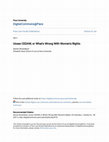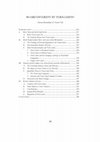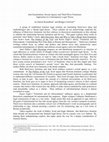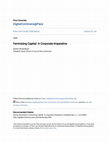Papers by Darren Rosenblum
Pace International Law Review
New York University Press eBooks, Sep 1, 2009

Before I go on, I want to tell a story. During high school, I had an English teacher who often wo... more Before I go on, I want to tell a story. During high school, I had an English teacher who often wore a pendant from the National Organization of Women. I asked her about it and we began a conversation that continued for years as she fed my voracious mind with Gloria Steinem, Alice Walker and other feminist literature. One day, on my way home from a meeting of Gay and Lesbian Youth of New York, I picked up the Village Voice and saw an announcement for a women's rights conference. My dad drove me into the city for the conference, which well over a thousand people attended. As part of the forum, individuals reported back from the 1985 World Conference on Women held in Nairobi. As people entered the hall, a slide show of conference photos ran alongside Helen Reddy's "I am Woman." Perhaps two or three men were there. Throughout the day, attendees approached me to inquire where they could find coffee or if I was in the right place. As a sixteen- year old boy with darker-t...

Eileen Boris, the Hull Professor of Feminist Studies and Professor of History, Black Studies, and... more Eileen Boris, the Hull Professor of Feminist Studies and Professor of History, Black Studies, and Global Studies at the University of California, Santa Barbara, writes on the home as a workplace—on domestic, industrial, care, and mother workers—and on racialized gender and the state. She is the President of the International Federation for Research in Women’s History. She holds a Ph.D. from Brown University in the History of American Civilization. Her books include the prizewinning monographs Home to Work: Motherhood and the Politics of Industrial Homework in the United States [Cambridge University Press, 1994] and, with Jennifer Klein, Caring for America: Home Health Workers in the Shadow of the Welfare State (Oxford University Press, 2012), as well as Intimate Labors: Cultures, Technologies, and the Politics of Care, coedited with Rhacel Parreñas (Stanford University Press, 2010). Caring for America became the basis for an amicus brief to the Supreme Court filed in support of the state of Illinois and SEIU in Harris v. Quinn. She now is writing a book tentatively called, Protection and Precarity: Global Standards, Gender Difference, and the ILO, which considers how the characteristics associated with women’s work have moved from the periphery to the center with transformations of the global economy and intensified regimes of precarity. Rosanna Hertz is the Classes of 1919 – 1950 Reunion Professor of Sociology and Women’s and Gender Studies at Wellesley College and the current Chair of the WGST department. In broad terms Hertz researches families in a changing economy and how social inequality at home and in the workplace shape the experiences of women and men. Presently she is interested in the pivotal moments that influence certain kinds of women leaders. Her research, “Productive Rule Breakers and Innovators” is based upon interviews with women leaders in China and India. Professor Hertz also researches the complexity of “modern families” created through the use of donor gametes in the U.S. and the E.U. and how the Internet is both revolutionizing the choices for people seeking to enter into thirdparty reproduction arrangements and creating new possibilities for connection. Her most recent book is Single by Chance, Mothers by Choice. Recent article have appeared in Journal of Law and the Biosciences, Social Science and Medicine and Journal of Family Issues. She is quoted in The New York Times, The Washington Post, The Wall Street Journal, Newsweek, The Los Angeles Times, The Chicago Tribune and The Boston Globe. She appears in the broadcast media commenting on social problems for local news specials. Professor Darren Rosenblum serves as the Executive Director of Commercial and Private International Law Programs and the Faculty Director of the Institute for International and Commercial Law at Pace Law School. His scholarship focuses on comparative and international private law and sex equality. His recent scholarship examines the burgeoning movement for corporate board quotas for women. In 2011, he was awarded a Fulbright Research Scholarship for France, where he performed an empirical study on the French quota involving board members of leading French companies. In June 2015, the French National Assembly hosted a conference on the corporate board quota at which he presented his research in French as the guest of honor. He has also presented his quota research at the Federal Election Commission (U.S.) and the European Commission Justice Department. He has presented his work in four languages (English, French, Spanish and Portuguese) in fifteen countries. Deborah J. Vagins is the Chief of Staff and Principal Attorney Advisor at the U.S. Equal Employment Opportunity Commission (EEOC) for Commissioner Charlotte A. Burrows. In this capacity, Deborah serves as the principal legal and policy advisor to the Commissioner rendering legal interpretations regarding federal civil rights laws governing equal employment opportunity and providing policy advice on agency actions. In addition to other duties, she also serves as a liaison for the Commissioner with high-level officials of the Commission, the White House, other government agencies, and congressional staff regarding complex legal and policy matters. Prior to joining the EEOC in 2015, Deborah was the Senior Legislative Counsel on civil rights issues for the American Civil Liberties Union Washington Legislative Office. In this position, Deborah was instrumental in advocating for major civil rights laws, including the Lilly Ledbetter Fair Pay Act of 2009, and served as co-chair of the national Paycheck Fairness Act coalition. She helped design and successfully advocated for recent executive action on employment discrimination issues, including the recent executive order banning punitive pay secrecy policies in federal contracting. Before working at the ACLU, Deborah was the Acting Deputy General Counsel and Senior Attorney-Advisor to the U.S. Commission on…

Corporate Governance: Internal Governance, 2019
Four-fifths of the corporate board seats in the United States are held by men and a shocking numb... more Four-fifths of the corporate board seats in the United States are held by men and a shocking number of companies lack any female representation on their boards. While institutional investors have pushed these companies for change, California took a more aggressive step and followed several European countries by mandating a quota for board representation. Heated argument has ensued over what diversity we should prioritize and what mechanisms should be used to promote diversity. Yet, could these challenges be avoided altogether, through the use of term limits? This Article is the first academic inquiry exploring the connection between term limits and the sex diversification of the corporate board. Drawing upon quantitative data on director turnover in the S&P 1500 and qualitative data on S&P 500 firms with term limits, our research shows that firms experiencing higher board turnover have more sex diversity. We argue then that term limits, a mechanism that increases turnover, may corre...

Canadian Journal of Women and the Law, 2015
A few years ago, when I received my child’s birth certificate in the mail after my husband and I ... more A few years ago, when I received my child’s birth certificate in the mail after my husband and I finalized her adoption, I was thrilled to see that the state had put my name in the ‘‘mother’’ slot. Within parenting, I have always longed to resist sex roles and have feared the same constraints would affect my child. In this peculiar moment of joy, without any intention, the state affirmed my difference. I also felt that it was beyond me to understand fully the implications of being my child’s legal mother in this context. In this sense, slotting a male parent into a ‘‘mother’’ slot clarifies perfectly the moment in which we sit that evinces a deep need for work such as that done in After Legal Equality. In many contexts, we have all the rights as if the sex binary no longer mattered, but it lurks to rear its head in the most curious of places.

A group of established feminist legal scholars are translating third-wave ideas and methodologies... more A group of established feminist legal scholars are translating third-wave ideas and methodologies into a vibrant legal theory. These scholars do not acknowledge explicitly the influence of third-wave feminism, but they embrace its theoretical commitments as they attempt to redefine the relationship between feminism and the law. This paper explores three works in particular: Janet Halley’s book, Split Decisions: How and Why to Take a Break from Feminism; Joan Scott’s book, The Politics of the Veil; and Karen Engle’s article, ''Feminism and Its (Dis)contents: Criminalizing War-Time Rape in Bosnia and Herzegovina.” Third-wave feminist writings (which focus on culture and politics and almost never law) instinctively reject essentialist presumptions of identity and embrace sexual agency and even libertinism. Janet Halley’s Split Decisions proposes an anti-identitarian perspective in rejection of rigid adherence to certain strains of thought within second-wave feminist legal theor...
Inversions — mergers in which one firm merges with another abroad to avoid taxes in its home coun... more Inversions — mergers in which one firm merges with another abroad to avoid taxes in its home country — have spread as globalization has reduced many of the transactional costs associated with relocating. As firms acquire the power to choose the laws that govern them, they challenge the sovereignty of nation-states, who find their ability to tax and regulate firms depleted. States and firms compete in a game of cat and mouse to adapt to this new global reality. The subversion of state power by these firms reveals the futility of walls, both literal and regulatory. This Essay describes the phenomenon of these “traveling corporations” and analyzes several remedies that could limit future mergers. We conclude by arguing that inversions provoke deglobalization and yet may continue to flourish despite it as firms take the lead in dictating global norms.

Berkeley Business Law Journal, 2009
The economic crisis has upended the divide between the public sector and the corporate world, as ... more The economic crisis has upended the divide between the public sector and the corporate world, as governments engage in mass intervention in the private sector. This crisis has exposed the need for new leadership in the corporate world. Gendered understandings of economic relations have surfaced – some argue that testosterone encourages excessive greed in boom cycles and fear in bust cycles, or that women can help clean up the mess. This Article explores capital’s Achilles heel – the exclusion of women from its leadership ranks – and one innovative remedy for this shortcoming. Despite a plethora of political representation quotas for women throughout the world, only Norway has instituted a quota to integrate women into corporate leadership. Passed in 2004, the Corporate Board Quota forces all publicly-listed companies to repopulate their boards to reflect a forty percent floor for either gender by the deadline of January 1, 2008, upon penalty of dissolution. This draconian penalty in...

University of Pennsylvania Journal of Business Law, 2017
Firms embrace diversity, especially with regard to sex. Overtly optimistic predictions of a diver... more Firms embrace diversity, especially with regard to sex. Overtly optimistic predictions of a diversity dividend, some built on sex stereotypes, lead these firms to count on profits that may never materialize. This Article attempts to reset the agenda on how to study corporate board diversity. We can only assess if and how sex diversity yields benefits by understanding the who, what, and where of diversity. Whether sex diversity produces a "diversity dividend" depends on three key factors: ( 1) the nature of the benefit of including women (whether for their experience or other qualities); (2) the kind of firm and its governance; and (3) the jurisdiction(s) in which the firm operates. Only by further investigating the precise conditions under which diversity will have an effect can we estimate the potential instrumental benefits of sex diversity. INTRODUCTION ................................................................................. 430 I. DIVERSITY: A CAUTIONARY NOTE ...

One of the highly contested issues today in corporate law and governance revolves around boardroo... more One of the highly contested issues today in corporate law and governance revolves around boardroom diversity, with an emphasis on gender diversity. In recent decades, unfortunately, despite the fact that women’s economic and political status have advanced significantly in the United States and around the world, women have yet to achieve parity with men on issues concerning representation and participation in the corporate world.This is evidenced by the stark lack of representation of female directors in the boardrooms of major public and private corporations.There are increasing calls for action from various groups, including academics and regulators. The following are some of the theories (rationales) calling to promote the election of women as directors, such as social issues, public good, organizational strategy, fair employment practices, and corporate governance. Such theories focus on the advancement of women and narrowing the gender salary gap, women’s contribution to society...

SSRN Electronic Journal, 2020
When Norwegian feminist activists began militating for a corporate board quota in 1999, nobody wo... more When Norwegian feminist activists began militating for a corporate board quota in 1999, nobody would have predicted that, fifteen years after its adoption in 2003 that most of the top ten world economies would follow suit. Norway’s statute took a clear, new direction for corporate governance and for equality law in two respects: 1) the central role that the private sector plays in determining questions of equality, and 2) the responsibility of the state to ensure that the private sector would rectify entrenched discrimination. The rapid adoption of quotas has feminized boards across Europe but also has exposed challenges in implementation. Hard quotas may result in short-term fixes that are less than ideal, but softer quotas, such as comply-or-explain regimes, may fail to achieve inclusion. Drawing on existing social science data, this Chapter examines the development of quotas in both common and civil law systems. It draws contrasts to assess the efficacy of these statutes. This Chapter suggests new directions that quotas may take as the urgency of inclusion mounts.
Politics & Gender, 2018
Given the predominance of men among elites, it is remarkable how little scholarship there is on t... more Given the predominance of men among elites, it is remarkable how little scholarship there is on the challenges of qualitative empirical work on elite men, especially work that interrogates the intersection of gender and class. We have both sought to include elite men as subjects, noting that the gender of our subjects, their social power, and our own gender performance have played a central role in defining our efficacy as researchers. Darren has researched top French corporate boards (e.g., Rosenblum and Roithmayr 2015). Janet has researched male dominance in the politics of Iceland and Russia (e.g., Johnson 2016; Johnson, Einarsdóttir, and Pétursdóttir 2013). This essay elaborates the challenges in researching elite men and explores the tactics we developed in response to the dynamic gender performances in the interviews, bringing…

SSRN Electronic Journal, 2019
Over the past few years, California became the setting for shocking tales of sex inequality and a... more Over the past few years, California became the setting for shocking tales of sex inequality and abuse in Hollywood and Silicon Valley. Decades after women achieved educational parity,1 men still run the corporate world. In response to these stories exposed by the #MeToo movement, California joined the transnational corporate board quota movement by converting its voluntary quota into a hard one. Will California’s first-mover status overcome constitutional objections and inspire other jurisdictions to act. Or is just utopian dreaming, California-style? This Essay argues that despite its many flaws, the quota may succeed in curbing male over-representation on corporate boards. After contextualizes the quota within the transnational corporate board quota movement, it rejects the U.S. reaction that emphasizes the private sector’s dominion over equality remedies. Despite the U.S. resistance to quotas, comparative experience reveals both that the private sector manages how quota implementation occurs. The Essay concludes that some public intervention — in concert with private efforts — remains necessary.
SSRN Electronic Journal, 2018
Firms embrace diversity, especially with regard to sex. Overtly optimistic predictions of a diver... more Firms embrace diversity, especially with regard to sex. Overtly optimistic predictions of a diversity dividend, some built on sex stereotypes, lead these firms to count on profits that may never materialize. This Article attempts to reset the agenda on how to study corporate board diversity. We can only assess if and how sex diversity yields benefits by understanding the who, what, and where of diversity. Whether sex diversity produces a "diversity dividend" depends on three key factors: (1) the nature of the benefit of including women (whether for their experience or other qualities); (2) the kind of firm and its governance; and (3) the jurisdiction(s) in which the firm operates. Only by further investigating the precise conditions under which diversity will have an effect can we estimate the potential instrumental benefits of sex diversity.
SSRN Electronic Journal, 2017
Cadernos do Programa de Pós-Graduação em Direito – PPGDir./UFRGS, 2014
Human Rights Documents online
Unsex Mothering 59 Come, you spirits That tend on mortal thoughts, unsex me here, And fill me fro... more Unsex Mothering 59 Come, you spirits That tend on mortal thoughts, unsex me here, And fill me from the crown to the toe top full Of direst cruelty!-Lady Macbeth, gathering the strength to commit murder. 2 4 Darren Rosenblum, Unsex CEDAW, or What's Wrong with Women's Rights, 20 COLUM. J. GENDER & L. (forthcoming 2011) [hereinafter Rosenblum, Unsex CEDAW]. 5 As discussed below, the panoply of sex traits creates the potential for many sexes.

Uploads
Papers by Darren Rosenblum